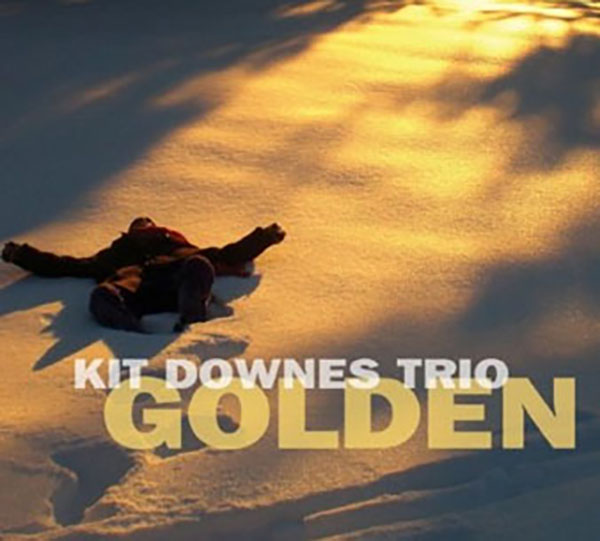
by Ian Mann
December 08, 2009
/ ALBUM
A hugely promising record that reveals fresh angles with each listening
The young pianist/organist Kit Downes has attracted a compelling amount of critical praise since first coming to prominence on the British jazz scene with the band Empirical. Arguably the most feted young musician since Gwilym Simcock Downes is in constant demand and has already appeared as a sideman with an impressive list of leading musicians including drummer Clark Tracey. Besides his current piano trio he also a regular member of Troyka and James Allsopp’s Golden Age Of Steam, appearing on organ with both of these bands.
Norwich born Downes is a graduate of the Royal Academy of Music and it was whilst studying there that he met Scottish bassist Calum Gourlay and young drum tyro James Maddren. Maddren is almost in as much demand as Downes himself. The drummer has recently recorded with pianists Ivo Neame and Gwilym Simcock and is very much a rising star in his own right.
The trio of Downes, Gourlay and Maddren has been playing together since 2005 and “Golden” represents their recording début The material consists of seven Downes originals plus Gourlay’s tune “Roots” and covers an impressive stylistic range. Traces of Mehldau and Jarrett can be heard in Downes’ playing but he also has a strong identity of his own, sometimes adding a touch of English whimsy to his writing. Gourlay and Maddren are ideal accompanists, sympathetic and fully in tune with Downes’ compositional ideas.
The trio open with “Jump Minzi Jump” a piece inspired by a wildcat kitten on a David Attenborough nature programme. There’s a suitably playful quality about the opening theme with it’s 60’s pop elements before the trio jump off into more complex territory inspired by Mehldau and Jarrett. Downes is a fluent improviser and Gourlay and Maddren match him every step of the way as the piece becomes more exploratory, but joyously so with an exuberant, leaping solo from Downes before the theme returns again, this time more gently. The piece makes an excellent opener, an exhilarating roller coaster ride full of clever musical ideas.
“Golden” itself originally appeared in a rather different setting on the recent Troyka CD. Here Downes solos melodically over Maddren’s persistent percussion tick, the pastoral mood reflecting the sunshine suggested in the title.
“Homely” has also appeared elsewhere being the title track of the album of piano duets Downes recorded with his tutor/mentor Tom Cawley. Downes opens with a lengthy passage for solo piano , again pastoral in mood and revealing his classical influences. The introduction of Gourlay and Maddren finds him improvising expansively but always melodically on an engaging theme.
Cawley’s influence is also discernible in the sometimes playful “Power and Patience (the bear)” another Attenborough inspired piece. A lively, percussive opening section is followed by a quieter, more abstract central episode before the theme returns, fragments into a passage of free playing and finally returns again. Downes and his colleagues are adept at these types of contrast and the main theme with it’s playful dissonance is reminiscent of Cawley’s work with his own trio Curios.
Downes describes Madame as “a love song without words” and dedicates it to his girlfriend Ruth Goller, the electric bass player with the current edition of Acoustic Ladyland. Appropriately it begins with Gourlay’s solo double bass and the steady pulse he establishes continues throughout the song as Downes solos above him in suitably tender and lyrical fashion. Maddren’s drumming is the epitome of subtly, his delicate brush work adding significantly to the overall mood of the piece.
” A Dance Took Place” opens with a passage of tumbling solo piano full of playful neo classical flourishes. A typical Downes theme then emerges, melodic and slightly quirky but open enough to invite some serious improvisation. Gourlay is featured extensively on bass exhibiting a big, resonant sound and a remarkable degree of dexterity on some slippery lines. Downes follows him with some intense keyboard work that reminds one in turn not only of Mehldau and Jarrett but also of his mentor Tom Cawley. In a piece of constantly shifting dynamics there is a feature for the excellent Maddren who contributes his most forceful playing thus far, emerging from his previous role as a subtle colourist.
Gourlay’s tune “Roots” sits well besides Downes’ compositions. Opening with Maddren’s solo drums the skeletal theme opens up a fascinating threeway musical discussion between the members of the trio with the leadership baton being passed around. Maddren’s intelligent,understated solo at the end brings imparts a neat symmetry to the piece.
Finally comes “Tom’s Tune”, Downes’s dedication to Cawley. The airy piano melody is well supported by Gourlay’s springy, agile bass ( he also features as a soloist) and Maddren’s delicate brushwork. Elegant, sometimes playful and highly melodic this is a fitting tribute to a much admired mentor and tutor.
However “Golden” serves notice that Downes is emerging from Cawley’s shadow. This is a hugely promising record that reveals fresh angles with each listening and this combined with the press frenzy (in jazz terms anyway) around Downes at present suggests that his is a star still on the rise. Expect to hear a lot more about this gifted and remarkably versatile young musician plus his two talented colleagues.
blog comments powered by Disqus